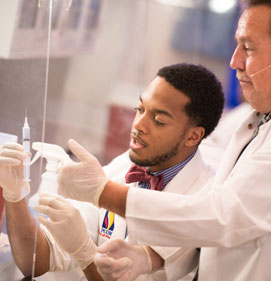There are two main types of environments where nuclear pharmacists are employed. Institutional
nuclear pharmacy is usually linked to a major medical center/hospital where preparations
are made on-site. This is in contrast to the commercial centralized nuclear pharmacy
where radiopharmaceuticals are prepared and then delivered to the hospital and/or
clinic. While the quantity of radiopharmaceuticals used is relatively small in both
settings, nuclear pharmacists must complete additional training in radiation safety
regarding the compounding, preparation, and delivery of radioactive materials.
“There are risks involved because you are working with radioactive isotopes,” Smallwood
said. "You have to wear a dosimeter to see how much radiation you are receiving and
each facility has limits as to how much exposure you can have.”
Most nuclear pharmacists, whether hospital-based or commercial, practice in a laboratory
environment. The radiopharmaceuticals must be prepared, tested and shipped so that
they are ready to administer when a patient arrives for a study. This usually translates
into the pharmacy opening early in the morning and with one or more pharmacists working
the “early shift” usually beginning at midnight. In addition, radiopharmaceuticals
must be available 24/7 for emergencies and a nuclear pharmacist is on-call at times.
The shifts and on-call are shared among the pharmacists.
"If you are not an early bird, [nuclear pharmacy] is not for you," Smallwood said.
All dosages are dispensed to the nuclear medicine physician who administers them to
the patient and handles the insurance processing. There are delivery drivers who transport
the doses to the physicians. The nuclear pharmacy is not open to the public due to
the nature of the products used.
 Nuclear pharmacy is a specialty area of pharmacy practice involved with the preparation
of radioactive materials to improve and promote health through the safe and effective
use of radioactive drugs to diagnose and treat specific disease states.
Nuclear pharmacy is a specialty area of pharmacy practice involved with the preparation
of radioactive materials to improve and promote health through the safe and effective
use of radioactive drugs to diagnose and treat specific disease states.